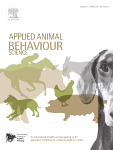Document type : Scientific article published in Applied Animal Behaviour Science
Authors: Catherine Reeve, Sophie Jacques
Preview: Dogs serve many roles in people's lives, whether as valued family members or trained workers. Their ability to respond to human nonverbal and verbal cues is central to these roles. We aimed to develop a comprehensive owner-reported inventory of words to which owners believe their dogs respond differentially and consistently. Our tool was modeled after the MacArthur-Bates Communicative Development Inventory (Fenson et al., 2007), a parent-report checklist that assesses infants' understanding and development of early language. The validity, reliability and usability of our measure was assessed with 165 owners of dogs of various ages and breeds. Owners identified words to which they believed their dogs responded. They reported that, on average, their dogs responded to 89 words (78 from the lists provided plus 11 added by them), half of which were commands. To examine potential owner- and dog-related predictors of words reported, owners also answered questions about their dogs and themselves. None of the owner characteristics measured uniquely predicted the number of words reported, but dogs' professional work status, how quickly they reportedly learn new tricks, and their breed type did. A Principal Component Analysis revealed that words to which dogs reportedly respond encompassed three distinct types: General Words, Verbs (Commands), and Nouns. Thus, based on owner reports, dogs seem to vary greatly not only in the number but also in the kinds of words to which they purportedly respond. Our inventory is intended for use in research on human-dog communication designed to address a variety of research questions.




